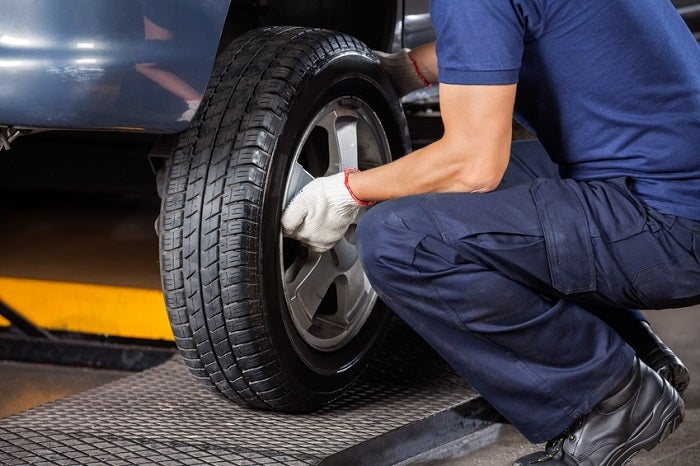Elevate Your Ride: Depend On Morris Tires for GMC Tires Service
Elevate Your Ride: Depend On Morris Tires for GMC Tires Service
Blog Article
Tire Service: The Influence of Climate Condition
When it comes to guaranteeing optimum performance and safety on the road, recognizing the influence of weather condition problems on tire solution is crucial. From scorching warmth to icy roadways, each climate element can considerably affect tire functionality and general driving experience. By delving into the results of varying weather on tires, vehicle drivers can obtain beneficial understandings that may enhance their vehicle's efficiency and long life. In this discussion, we will check out the intricate connection between weather and tire service, clarifying the significance of weather-specific tire upkeep methods and considerations.
Heat and Tire Performance
When exposed to high temperature levels, tires experience adjustments in performance that can dramatically influence vehicle security and handling. The warmth generated from long term driving or heat problems causes the tire rubber to soften, resulting in lowered tread life and raised wear. As the rubber ends up being softer, the tire's grasp on the roadway diminishes, affecting braking distances and total grip. In severe cases, too much warmth can even trigger tire blowouts, positioning a severe safety threat to the lorry and its owners.

Cold Climate Effects
Winter problems can have a considerable influence on tire efficiency and security. As temperature levels decrease, tire rubber can harden, resulting in decreased grip on icy or snow-covered roads. In winter, tires may likewise shed atmospheric pressure more quickly, which can affect handling and fuel efficiency. Furthermore, cold temperature levels can create tire sidewalls to tense, enhancing the danger of damage from holes or other roadway risks.
To reduce the results of winter on tires, it is essential to consistently inspect tire stress and inflate them to the supplier's advised levels. Making use of winter season or all-season tires created for cool climate problems can likewise improve grip and hold on icy or snowy roadways. Appropriate tire upkeep, consisting of normal inspections for wear and damage, becomes a lot more crucial during colder months to ensure optimum performance and safety and security.
Rainy Issues Impact
Throughout wet problems, tire efficiency and security can be significantly affected by the wet road surface areas and minimized presence. The tread pattern of tires plays an important role in keeping grip on damp roadways. Tires with worn-out footsteps are a lot more susceptible to hydroplaning, where a layer of water develops in between the road and the tire surface area, resulting in loss of grip. To battle this, drivers ought to frequently inspect their tires for sufficient walk deepness and think about buying tires specifically designed for damp conditions.
Furthermore, rainy weather can also decrease exposure, making it challenging for vehicle drivers to see the road ahead plainly (GMC Tire Service). In such conditions, it is necessary to readjust driving speeds as necessary and keep a secure adhering to range to permit sudden quits. Correctly filled with air tires can also aid in preserving control on wet roads by giving far better handling and hold
Snow and Tire Safety
Snow-covered roads position distinct challenges for chauffeurs, stressing the significance of correct tire option and maintenance. When driving in snowy problems, having the right tires can make a considerable difference in security and performance. Wintertime tires are designed with unique rubber substances and tread patterns to provide much better grip on snow and ice contrasted to all-season tires. The much deeper treads and sipes of wintertime tires help grasp the road much better, reducing the risk of sliding Continued and slipping.

Additionally, vehicle drivers should consider mounting tire chains in severe snowy problems. Tire chains give extra grip by clutching the snow and ice, enhancing security and control. However, it is crucial to follow manufacturer directions when installing and using tire chains to avoid damages to the tires and car. By picking the appropriate tires, keeping appropriate inflation, and taking into consideration extra traction aids like tire chains, vehicle drivers can boost their security when navigating snow-covered roads.
Weather-Related Tire Upkeep
Weather-related tire maintenance includes an array of techniques intended at making certain optimum tire feature and long life in various climate situations. One crucial element of weather-related tire maintenance is tire stress regulation. Evaluating tire step consistently and replacing tires when tread wear reaches a particular deepness is crucial for preserving grip and stability in unfavorable climate.
Conclusion
To conclude, climate condition have a substantial influence on tire performance and safety and security. From heat influencing tire stress and put on to winter minimizing traction, it is important to take into consideration the weather condition when maintaining and making use of tires. Stormy problems can reduce grip and cause hydroplaning, while snow can enhance the danger of crashes if tires are not properly furnished. Weather-related tire maintenance is critical in ensuring optimal performance and security on the roadways.
In this discussion, we will explore the complex connection in between climate problems and tire service, shedding light on the relevance of weather-specific tire maintenance practices and considerations.

Report this page